Here at Film Obsessive we’re, well, obsessive. About film. But you knew that. What you want to know is who’s going to win the gold this year! With the 96th Academy Awards Ceremony just around the corner, the Film Obsessive staff has been obsessing once again about who will win what. As it turns out, 2023 was a banner year for film art, with two wholly and wildly original films leading the summer box office and the list of nominees both. Beyond Barbenheimer, there were plenty of excellent smaller-scale films scattered across the year as well as a some great animated, documentary, and foreign fare.
Has the industry fully recovered from the pandemic? Is the golden age of superhero cinema over? Film may be experiencing a period of rapid change, but this year’s awards season so far feels oddly free from the controversy and turmoil that marked that of prior years. The most pressing oversight has seemed to be the Academy’s overlooking Greta Gerwig in the Directing category—and its lead star Margot Robbie in the title role—even if Barbie hardly went unrecognized, especially for a film based on a child’s toy.
In the months leading up to the Academy Awards, the growing chorus of awards-givers has focused on singing the praises of Christopher Nolan’s Oppenheimer to the exclusion of almost everything else. We may not be expecting any wild upsets, but we are seeing the heady momentum Nolan’s film has gained. Expect Oppenheimer to take most of the big awards.
Even then, we at Film Obsessive staff—Tina Kakadelis, Seth Lamey, Jay Rohr, Don Shanahan, Michael Suarez, and J Paul Johnson—foresee some exceptions to Oppenheimer‘s reign and some Oscar love to get spread around the room. Here are our staff’s collective predictions for the winners in each of the top categories.
Original Screenplay: Anatomy of a Fall

Adapted Screenplay: Barbie

Here’s one of the few races we predict to be a toss-up come Oscar night, and the race could hardly be between two more diverse entrants. Neither is exactly a traditional competitor in the category, but of the two, American Fiction, a close-to-the-book adaptation of a critically acclaimed novel, is the more so. Percival Everett’s Erasure was a white-hot, cocksure sendup of academia and literary publishing to match Spike Lee’s long-unheralded Bamboozled, presenting an art made for the sake of popularity that, like a modern-day Frankenstein’s monster, quickly runs amok.
Cord Jefferson took few risks in his adaptation of Erasure as American Fiction, hewing closely to his source novel’s characters, plot, and themes, and gracing them with a perfect cast performing with crisp timing. It’s an excellent film, and one very much like the type the Academy likes to award here: a faithful adaption on a timely topic led by a stellar cast. That said, here at Film Obsessive we predict this to be the one category where Great Gerwig’s Barbie will get its due. Shut out of the nominations for Lead Actress and Directing and about to be steamrolled by Oppenheimer in other major categories, Barbie is our pick for Best Adapted Screenplay.
What’s it adapted from? A fair question, since there is no single extant source from which the film’s narrative is adapted. (Even if there is a something of a Barbie cinematic universe preceding it.) It may make no sense on the surface to locate an American Fiction and a Barbie in the same category for both “adapting” their content. Even the makers of Barbie campaigned for their film to be nominated for Best Original Screenplay, and the film was designated as such by the Writers Guild of America. But the Academy, in its tortured wisdom, tends to consider films about pre-existing characters as “adapted,” even if the nominated film in question has next to nothing other than the character in common with whichever prior sources, be they a play, comic, novel, or game, predated it.
Got it? Go figure. Anyway, while American Fiction would certainly be a deserving candidate, our prediction come Oscar night is that Barbie won’t go home completely empty-handed. It’ll bring home the statuette for this most curiously defined of Oscar categories. — J Paul Johnson
Actress in a Supporting Role: Da’Vine Joy Randolph, The Holdovers
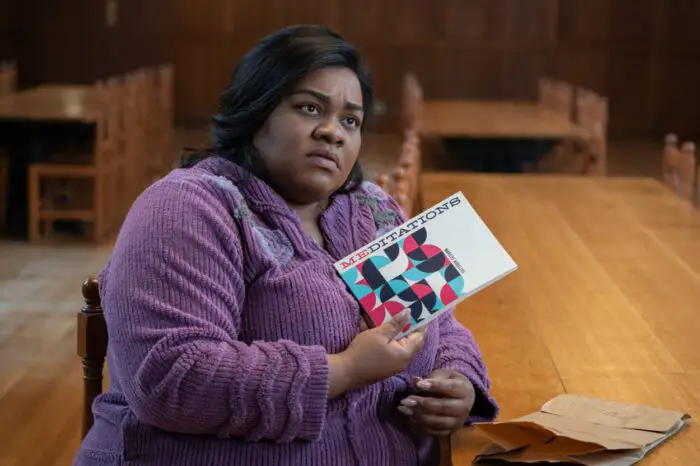
There are some actors that you just know are going to make it big and for me in the past few years, that has been Da’Vine Joy Randolph. I first saw her in Miranda July’s criminally underrated Kajillionaire where Randolph had maybe twenty lines in the whole movie, but there was just something about the simplicity and sincerity of her delivery that I got hooked on. Every time she would show up in a movie or TV show, I’d get a little thrill because of how good she is. Randolph has this beautiful, wry humor that can be seen in Only Murders of the Building and The Lost City where she effortlessly stole scenes from Sandra Bullock.
Randolph seems to be the shoo-in for the Supporting Actress award come Oscar Sunday. In The Holdovers, she plays the cook at a boarding school who is mourning the loss of her son. Randolph was the selling point for me in this film, why I sought it out in the first place. More than Paul Giamatti or Alexander Payne, I was there for Randolph.
Her role in The Holdovers is understated. Randolph’s performance as Mary is so quietly heartbreaking that it feels unbearable at times. The moment in the film that broke me was a scene with Randolph. It comes toward the end of the film and she is alone in a room. She does not speak, the entire weight and heart of the scene is in her actions and facial expressions. It’s a devastating scene, one that makes me never want to revisit the film for fear of opening the dams of tears again. — Tina Kakadelis
Actor in a Supporting Role: Robert Downey, Jr., Oppenheimer

In an interesting flip from the normal pecking order of who gets what roles, the 96th Academy Awards find themselves with a Supporting Actor category more star-studded than that for Lead Actor. Compared to long-time ham-and-egger character actors like Colman Domingo, Paul Giamatti, Jeffrey Wright, and Cillian Murphy up for Lead Actor this year, the Supporting Actor nominees include A-list big hitters like Robert De Niro, Ryan Gosling, Mark Ruffalo, Robert Downey Jr., and a three-time Emmy winner in Sterling K. Brown. It is, by far, the spicier field.
Some of the very same spiciness can be said for the race itself in this category. If there is a name or flavor, if you will, missing from this group, it would be May December’s Charles Melton, the winner of several lead-up critics awards for Best Supporting Actor. Another suitable addition would have been any cast member young (Jeremy Allen White) or old (Holt McCallany) from The Iron Claw. Perhaps those weren’t big enough names to hang here. Yet, it is the biggest name among them—namely Robert De Niro from Killers of the Flower Moon—who is the weakest selection of the bunch.
Getting down to business, this was initially a two-contender battle between “Barbenheimer” phenomenon rivals. Barbie’s Ryan Gosling had some early awards season favor with a few critic association wins, including an Astra from the Hollywood Creative Alliance, but Robert Downey Jr. has rode the Oppenheimer wave higher than Gosling’s beach. The former Avenger has dominated the final leg of the Oscar race with signature wins at the Critics Choice, BAFTA, and SAG Awards. March 10th looks to be the date this fan-favorite career receives its crowning achievement. — Don Shanahan
Actress in a Leading Role: Lily Gladstone, Killers of a Flower Moon
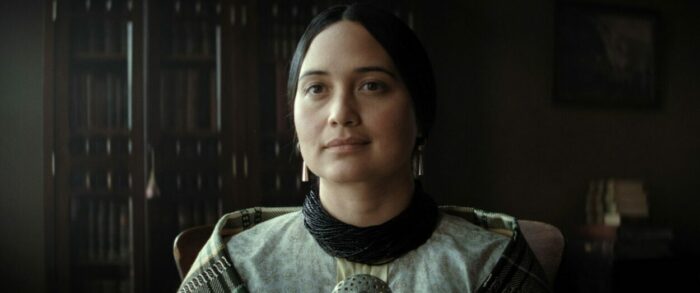
The performances from the two lead contestants for this Oscar—Lily Gladstone in Killers of the Flower Moon and Emma Stone in Poor Things—are examples of why awards can be frustrating. Both performances require different things from each actor. Is it fair to put them side by side and judge who did it better when the characters these two created are so unlike each other? What of the other three nominated? Annette Bening, Carey Mulligan, and Sandra Huller all did exceptional jobs, as did plenty of others who did not get nominated. Still, exceptional work is exceptional work, and it’s no wonder why these two have been the frontrunners for some time now. General wisdom is that this is a tight race between Gladstone and Stone, and had Stone not won a few years ago for La La Land, I would’ve agreed. However, the fact that Stone already has an Oscar does seem to give the edge to Gladstone.
Last year, Cate Blanchett was riding high on her incredible performance in Tar. Then things shifted as Everything Everywhere All At Once began taking home award after award. This hasn’t happened with Killers of the Flower Moon or Poor Things. Neither seem poised to win Best Picture this year. But there is something to be said about Michelle Yeoh winning last year, and not just because EEAAO also did. Blanchett, like Stone, has an Oscar already (two actually!), and the Academy does like to award new faces in acting categories. Overall, all five nominees deserve to be there, but Lily Gladstone managed a great performance that also rose above Leonardo DiCaprio and fellow nominee Robert De Niro. Add that she’s never been nominated before—and that she is the first Native American woman to be nominated for Lead Actress—and she is our pick to win on Oscar night. — Michael Suarez
Actor in a Leading Role: Paul Giamatti, The Holdovers
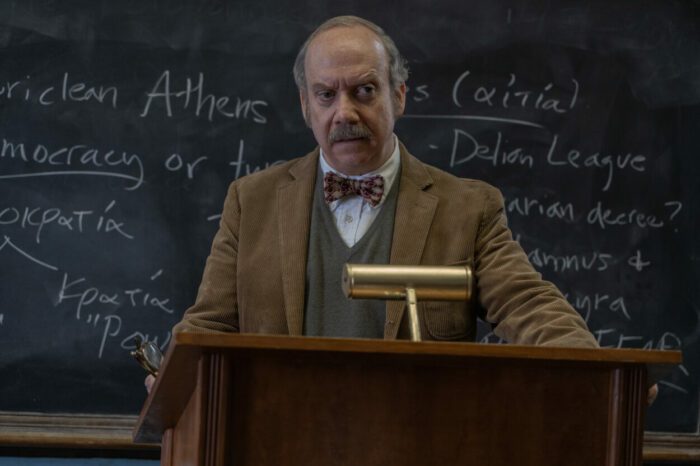
We expect the race for Lead Actor to be one of the few hotly contested at the 96th Oscars. For his performance as Paul Hunham in Alexander Payne’s The Holdovers, Paul Giamatti won the Golden Globe for Best Lead Actor in a Comedy while, Cillian Murphy won Best Lead Actor in a Drama for his titular role in Christopher Nolan’s Oppenheimer. Murphy also recently won the BAFTA and SAG awards for Best Lead Actor, so he might well have the inside track for the Oscar.
There is no denying the inevitability of Oppenheimer cleaning up at the Oscars this year, and Murphy, with his vital lead performance, would be a very deserving winner. Murphy has made a career as a supporting actor (mostly in Nolan’s films) and his understated embodiment of the titular character in Oppenheimer drives much of the three hour biopic. Depicting J. Robert Oppenheimer from his early 20s to late in his life and every step between, Murphy does so with grace and precision.
But we choose Giamatti for a couple reasons. Oppenheimer is going to win many awards on Oscar night that the Lead Actor category is just one place the Academy can “share the wealth,” so to speak. Giamatti is a three-decade-plus industry veteran, and this is his second Oscar-nominated performance; the Academy just might be ready to honor his body of work. That’s not to say he isn’t perfectly deserving on his own merits: his performance in The Holdovers as disgruntled teacher Paul Hunham shows the range of charm, emotion, and humanity that he is capable of as an actor. Giamatti’s character’s interactions with Angus (Dominic Sessa) and Mary (Da’Vine Joy Randolph) and his evolution as as a character are highlights of the film.
Giamatti’s performance in The Holdovers is a career-defining one and just might provide what now looks like a bona fide upset come Oscar night. Look for the industry veteran to take home the coveted statuette for his performance as the crusty, smelly, “wall-eyed” prep-school teacher in The Holdovers. — Seth Lamey
Directing: Christopher Nolan, Oppenheimer
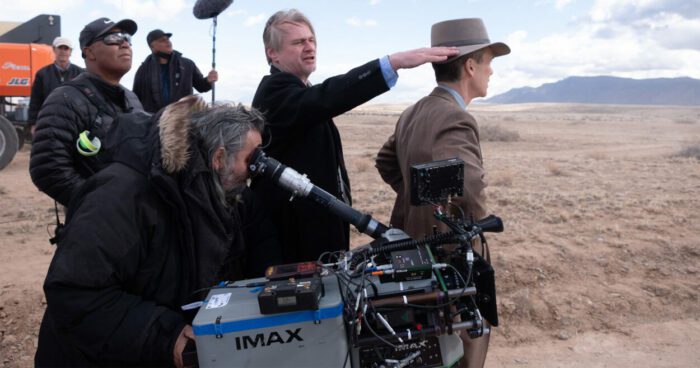
Coming to the category of Best Director, we arrive at one of the two places carrying the loudest social media blowback faced by this year’s Oscars. When the nominations were announced on January 23rd without Margot Robbie’s name in Best Actress and Greta Gerwig’s in Best Director, the public outcry from Barbie fans quickly reached an outrage level. I can’t say I blame those folks posting, tweeting, and hashtagging their support. Greta Gerwig deserves to be in this category, period.
The funny thing is the weakest spot among the five Best Director nominees that probably should have gone to her was the one occupied by the most celebrated and decorated name among them: Martin Scorsese. With Killers of the Flower Moon, he did all the things Greta Gerwig didn’t with Barbie. Scorsese didn’t challenge himself outside of his roots, leaned on male leads for a female-centered story, delivered an excessively long saga lacking punch, and preened himself on screen to deliver a self-serving and self-important coda. He’s a legend, but he shouldn’t be here.
Meanwhile, the Academy sought to reward foreign films with two Best Director nominations between Justine Triet for Anatomy of a Fall and Jonathan Glazer for The Zone of Interest. While it’s a progressive nod to the worldly side of cinema, the two will cancel each other out on the ballots. That leaves the helmers of the two films with the most nominations this year: Oppenheimer and Poor Things.
In what is shaping up to be one of the locks of the night, Christopher Nolan should finally capture the golden statuette that has eluded him (and his FilmBro followers) for a long time. The recent Directors Guild of America award going his way sealed it. Those voters who pinched their noses at the comic book stench of The Dark Knight or turned those same noses away from the sci-fi scents of Inception and Interstellar aren’t doing so this time. Oppenheimer may not go down as Nolan’s best or most remembered film when his career is all said and done, but it is his most complete traditional drama to date. — Don Shanahan
Picture: Oppenheimer
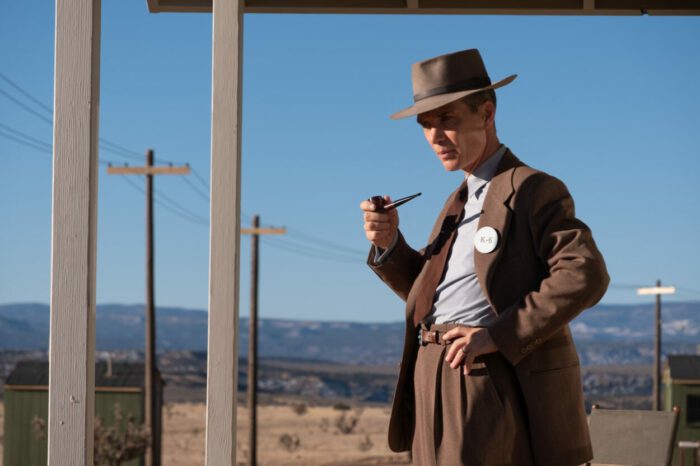
Don’t expect any drama come Oscar night related to this category. Anything other than a night-capping toast to the achievement of Oppenheimer would be an upset of atomic proportion. Christopher Nolan’s sprawling biopic charting the rise and fall and legacy of J. Robert Oppenheimer not only led the field with 13 Oscar nominations this year, it’s been collecting hardware right and left throughout the leadup to this year’s ceremony.
Oppenheimer’s momentum feels almost too strong to deny, despite some game competition. There is, of course, its twin-bill sister Barbie, likely to be nearly shut out come Awards night despite its being a good deal more culturally relevant and influential than most of the films nominated. Were it not for the juggernaut of these two summer blockbusters, a left-field choice like the near-perfect The Holdovers or the quirky Poor Things (nominated for 11 Academy Awards) might be a contender. Films like The Zone of Interest and Past Lives, despite their excellence, hardly suggest the necessity of the ten-strong nominations field; they’re here to remind us that the Academy has no prejudice against smaller-scale thoughtful dramas and to give some lesser-known fare a bit of recognition. Just not for them to win.
There’s nothing the Academy loves more than a crowning achievement, and for Christopher Nolan, whose career has been filled with challenging, complex, and occasionally uneven fare—some of it incoherent and not infrequently inaudible—a three-hour epic about a historical figure hard to know and harder to love has become his most accessible, commercially successful film not about a Batman. And it is excellent, anchored by substantive performances from its two leads, Murphy and Downey, Jr., who rarely meet onscreen, and Nolan’s penchant for special effects and visual design, used with some greater discretion here than elsewhere.
Whether it is truly “best” among a diverse and strong field, who knows? As viewers, we get to watch and revel in them all. The Academy’s vote, though, we predict, will be conclusive: Oppenheimer will without doubt take home the award for Best Picture, likely its sixth or seventh of the night, crowning a career night for its director Christopher Nolan and all involved and capping off a year that marked both a return to artistic form and to the theaters for the industry. — J Paul Johnson



